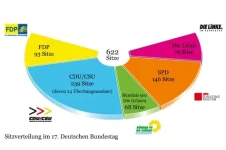German guy
DP Veteran
- Joined
- Jun 9, 2010
- Messages
- 5,187
- Reaction score
- 4,255
- Location
- Berlin, Germany
- Gender
- Male
- Political Leaning
- Moderate
Since most of you here are not German, I thought some of you might be interested in a short introduction to German politics. Some of you know will probably know much of it, but for everybody else, here it is:

Germany is a federal republic consisting of 16 states ("Länder"). Germany has 82 million inhabitants and is the most populous country in the European Union (followed by France, Italy and the UK with ca. 60 million each).
Germany has a parliamentary political system, like in Britain, Israel and many other European countries: The people elects the parliament ("Bundestag") and a majority in the parliament then elects the head of government, the Federal Chancellor. One term lasts 4 years.
Unlike Britain, Germany is a federal state, so the federal states are represented in a second chamber of parliament, the "Bundesrat" (=Federal Council). The "senators" are not elected directly, but each state government appoints their representants. Their number varies between three and seven IIRC, depending on the population of the respective state.
While the Chancellor is the head of government, Germany also has an equivalent to the British Queen: The Federal President, who is not directly elected, but by the parliament and an equal number of state representants. The President has not much political power compared to the Chancellor. His job is more representative and above partisan bickering -- like the monarch in parliamentary monarchies. His term is 5 years.

The federal parliament is elected by a proportional representation system, unlike in Britain, but much like in the Netherlands or Israel: After an election, the seats are distributed proportionally over the parties according to their number of votes -- so if party A makes 35% of the votes, it gets approximately 35% of the seats. An exception is due to the 5%-hurdle: Parties with less than 5.0% of the votes don't enter the parliament. (Actually, it's a bit more complicated, but I'll leave it at that.)
Due to this proportional representation, the political landscape is very colorful: We don't have just two large party dominating it all, but there are five parties in the German federal parliament currently.
Because of this, to form a government majority to elect a chancellor, when no party wins 50%+ of the seats, two or more parties have to agree on a cooperation treaty, forming a coalition. Just like the cons and libs in Britain have formed a coalition -- but in Germany, it's common and not an exception. Only once, in 1957, one party has won 50% of the seats alone (the conservative Christian Democrats, CDU/CSU).
Since 2009, a center-right coalition of conservative CDU/CSU and libertarian FDP is governing Germany.
In order to find catchy labels for different coalitions, we use colors in colloquial language for the different parties:
(to be continued...)

Germany is a federal republic consisting of 16 states ("Länder"). Germany has 82 million inhabitants and is the most populous country in the European Union (followed by France, Italy and the UK with ca. 60 million each).
Germany has a parliamentary political system, like in Britain, Israel and many other European countries: The people elects the parliament ("Bundestag") and a majority in the parliament then elects the head of government, the Federal Chancellor. One term lasts 4 years.
Unlike Britain, Germany is a federal state, so the federal states are represented in a second chamber of parliament, the "Bundesrat" (=Federal Council). The "senators" are not elected directly, but each state government appoints their representants. Their number varies between three and seven IIRC, depending on the population of the respective state.
While the Chancellor is the head of government, Germany also has an equivalent to the British Queen: The Federal President, who is not directly elected, but by the parliament and an equal number of state representants. The President has not much political power compared to the Chancellor. His job is more representative and above partisan bickering -- like the monarch in parliamentary monarchies. His term is 5 years.

The federal parliament is elected by a proportional representation system, unlike in Britain, but much like in the Netherlands or Israel: After an election, the seats are distributed proportionally over the parties according to their number of votes -- so if party A makes 35% of the votes, it gets approximately 35% of the seats. An exception is due to the 5%-hurdle: Parties with less than 5.0% of the votes don't enter the parliament. (Actually, it's a bit more complicated, but I'll leave it at that.)
Due to this proportional representation, the political landscape is very colorful: We don't have just two large party dominating it all, but there are five parties in the German federal parliament currently.
Because of this, to form a government majority to elect a chancellor, when no party wins 50%+ of the seats, two or more parties have to agree on a cooperation treaty, forming a coalition. Just like the cons and libs in Britain have formed a coalition -- but in Germany, it's common and not an exception. Only once, in 1957, one party has won 50% of the seats alone (the conservative Christian Democrats, CDU/CSU).
Since 2009, a center-right coalition of conservative CDU/CSU and libertarian FDP is governing Germany.
In order to find catchy labels for different coalitions, we use colors in colloquial language for the different parties:
(to be continued...)






